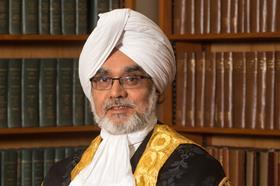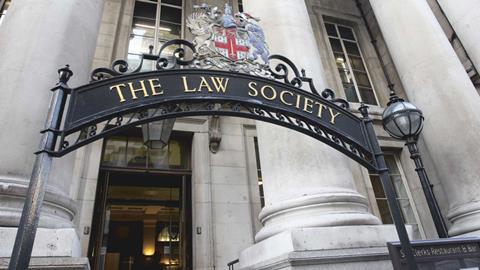The Law Society has declared victory in its High Court battle against the government over criminal legal aid fees.
Chancery Lane took the government to court over the decision not to raise criminal legal aid fees by the minimum 15% recommended by the independent criminal legal aid review (CLAIR) in December 2021.
The Society argued that the lord chancellor:
- breached the duty to provide criminal legal aid in accordance with section 1 of the Legal Aid, Sentencing and Punishment of Offenders Act (ground one)
- acted irrationally (ground two)
- failed to provide adequate reasons (ground three); and
- breached the duty to make adequate enquiries (ground four).
In a 61-page judgment handed down today, Lord Justice Singh (pictured) and Mr Justice Jay found in favour of the Society on aspects of its claim under grounds two and four.
The judges declared that the lord chancellor’s failure, during the decision-making process, to ask whether fee increases at lower levels than the 15% recommended by the review would still deliver the aims and objectives of the CLAIR report was ‘irrational’. The lord chancellor’s ‘failure to undertake any modelling to ascertain whether the aims and objectives of the CLAIR report, in particular ensuring the sustainability of criminal legal aid, would be furthered if fee uplifts lower than the 15% recommended by the CLAIR report were implemented’ was also declared irrational.

During last month's hearing, the Law Society's lawyers argued that by ignoring the independent review’s recommendations, the government’s decision was irrational, lacked evidence-based reasons and breached the constitutional right of access to justice. The Ministry of Justice said a few duty solicitor schemes under particular strain did not amount to widespread systemic failure in the criminal legal aid sector.
The Law Society was backed by the Criminal Law Solicitors Association and London Criminal Courts Solicitors Association, which filed 22 witness statements and evidence from members who described working conditions and remuneration as ‘degrading’, ‘demoralising’, ‘relentless’ and ‘ridiculous’.
The judges said today: 'What this impressive body of evidence brings home is the women and men working up and down the country at all hours of the day and night, in difficult and stressful circumstances, carrying out an essential service which depends to a large extent on their goodwill and sense of public duty.'
While the judges did not uphold ground 1, they were ‘troubled…by the depressing evidential picture depicted by the Law Society and interested parties’.
Law Society president Nick Emmerson said: ‘We may have won the court battle but it’s the public who will lose out in custody suites and courtrooms across the country unless the government takes immediate action to stop the exodus of duty solicitors from the profession. 1,400 duty solicitors have left since 2017 because the work is not financially viable.
‘We are already seeing that there simply aren’t enough solicitors to represent suspects at police stations and magistrates’ courts day and night across the country. This situation will only get worse with potentially dangerous consequences for society. The imbalance between the defence and the prosecution will continue to grow and public trust in the criminal justice system will continue to fail.’
The Society wants the government to now ensure the key recommendation of the independent review – a 15% fee uplift – is implemented for solicitors as soon as possible, and commit to ensuring criminal legal aid rates become economically viable in the long term.
Emmerson said: ‘Reversing [former lord chancellor Dominic] Raab’s irrational decision would be an important step to demonstrate the government is serious about ensuring that we may once again have a criminal justice system worthy of the name. A system which works effectively and efficiently needs to attract and retain lawyers on both sides to ensure balance between defence and prosecution. We are keen to work with the lord chancellor to help take the necessary steps to safeguard the future of this crucial profession.’
LCCSA president Edward Jones hopes the government ‘takes this opportunity to seriously address the crisis that is currently enveloping legal aid criminal defence firms and provide a new funding settlement that seeks to properly address the magnitude of the problem’.
CLSA chair Daniel Bonnich said: ‘We are an aging and endangered species and without significant investment we will become extinct rather abruptly. Without us, the police and the courts cannot function, denying justice for defendants, witnesses, and victims. The government needs to act now to avert disaster.’
A Ministry of Justice spokesperson said: 'While the claimants were successful on specific narrow grounds, the majority of their arguments were rejected by the court. We will consider the judgment carefully. Just this week we announced a consultation that would lead to £21m being invested in criminal legal aid solicitors. We expect our existing reforms to increase spending on criminal legal aid by up to £141m a year.'
Criminal Bar Association chair Tana Adkin KC said it shiould not take a High Court ruling, two years after the review, to restate that for both solicitors and barristers an annual level of 'at least 15%' above the previous levels was needed as emergency treatment for the criminal justice system.
'The criminal bar was forced to take action in 2022 when the government refused to implement its own review's recommendation. 'The 15% as "the minimum necessary as the first step in nursing the system of criminal legal aid back to health after years of neglect" now needs to be supplemented,' Adkin said.




























20 Readers' comments